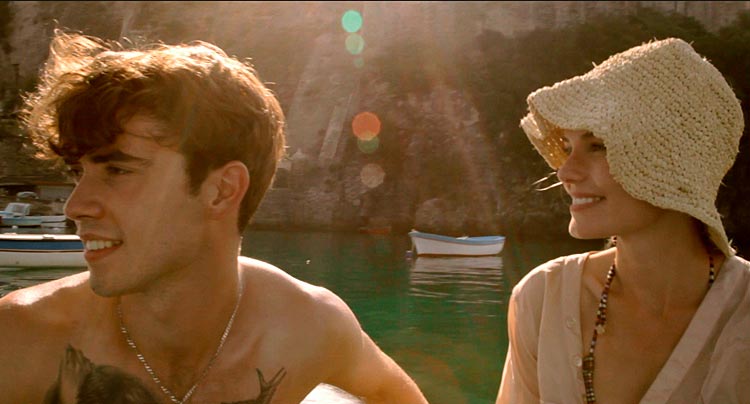
Simple premise, predictable conflicts, and unexpected resolutions.

Simple premise, predictable conflicts, and unexpected resolutions.
Kat Coiro’s tender romantic drama And While We Were Here takes us into the romantic, yet foreign, background of Italy to emphasise a situation that’s all too familiar – a marriage in trouble. The film was originally screened in black and white on the festival circuit, but was converted to color for general release. This was a wise decision for two reasons: firstly, it avoids alienating certain audiences, given the current mindset most people have about black and white films; and secondly, the settings are just too beautiful to take away their color and vibrancy. Though this does lead to more focus on the scenery than the development of the characters, the film is nevertheless a unique tale of a woman discovering herself when it seems too late.
Married couple Jane (Kate Bosworth) and Leonard (Iddo Goldberg) are in Naples for two weeks while Leonard is playing the viola in an orchestra, it quickly becomes clear that he has stronger feelings for his instrument than he does for her. There are no disagreements between the two, simply a lackluster attitude toward the other. While this inspires some sympathy, (particularly for Jane, since Leonard seems to be about as interesting as… well, a violist) it isn’t much, since we never knew them when they were happy; this lack of contrast makes it hard for us to feel a sense of loss at the disintegration of their marriage.
On the other hand, it does mean that when Jane meets 19 year old Caleb (Jamie Blackley) we’re as relieved as she is to finally see some sparks. While their chance encounter quickly evolves into a whirlwind affair caught up in the romance of the city around them, the relationship between Jane and Leonard becomes even more strained, despite Leonard’s obliviousness to the entire situation, eventually building up to Jane’s climactic decision – and, refreshingly, it’s not what you’d expect.

This is where the film’s strength lies – in its lack of predictability and its unique take on marriage – because it understands (in a way few romantic films do these days) that it cannot possibly speak for all relationships, and instead chooses to focus on the individuality of one. This individuality is especially clear in Blackley’s character; the carefree teen with a love of beauty isn’t just a stereotype, but is also intelligent, ambitious, and mature. Particularly as he’s mature enough that the age difference seems negligible, it’s not hard for us to be seduced by what he represents just as much as Jane is. Rather, Leonard’s reliability functions as a flaw when shown in such proximity to Caleb’s spontaneity.
The film’s soundtrack is punctuated by Jane listening to tapes of her grandmother’s recollection of living through two world wars as she wanders through the streets of Italy. While this provides an interesting narrative, and is often poignant when it seems her grandmother’s words apply to her own life, it also seems a little too convenient; it often turns moments that could have been subtly intriguing into something of a conspicuous agenda. Kate Bosworth’s reactions to these realisations, however, inject some vital legitimacy to the plot, as she does a fantastic job of building our involvement with Jane’s emotions. In contrast to those instances in which we’re hoping for a character to take a certain course of action, we’re instead as unsure of what we want as she is of her own desires.
And While We Were Here, with its simple premise, predictable conflicts and unexpected resolutions, is both every romantic film you’ve seen and every romantic film you haven’t seen. What originally seems a slightly pointless venture soon shapes into an organic experience that stirs our own thoughts on life, death and love. Indeed, it picks up on tensions present so pervasively through film and society that it’s hard to feel as though it’s not an argument you’re having for the twentieth time. What makes this film worth watching is that for the first time, the argument doesn’t end the same way.